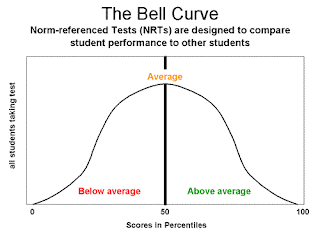The author, David Bornstein, of this article begins by asking: “Is it possible to eliminate the bell curve in math class?” After all, as Berstein points out, most people would be appalled to hear that someone is illiterate, but not knowing (or liking) math is almost expected. As an example, almost every person that I divulge that I’m a math major in college respond by making an “oh…wow” noise or comment, as if I am a brave soul for taking on math in college. Now, college math certainly is not easy, but what are these people’s responses saying about how math is viewed by even college-educated people?
As a realistic optimist, my response to Bornstein’s question is “no, the bell curve cannot be *eliminated* in math classes,” with the emphasis on “eliminated.” With some major changes in how math is taught, approached and viewed, the bell curve may be able to flatten out the bell curve. However, I would argue that this question, ultimately, is the not the question that be asked, and the author also suggests this with his question: “Can we improve the methods we use to teach math in schools — so that everyone develops proficiency?” In an indirect way, my goal is to teach my student’s math in a way that they don’t end up loathing it in the future, by helping students gain an appreciation and at least a proficient understanding of math. Unfortunately, by the time they get to me (in middle or high school), math anxiety is likely to have already been planted in their experiences, which typically adversely affects girls.
Stereotypes of girls being worse at math infiltrate not only student’s minds, but are likely to passed down to female students by the proportionately high number of female elementary teachers. Read more about math anxiety in this article. Hence, one little step that I plan to take as a teacher is to instill a confidence in all of my students that they can do math, no matter their gender. Although I certainly won’t “favor” my female students, I will be hyper-aware and sensitive to any negative self-talk about math from my female students in particular. I desire to be a teacher that guides students into understanding and self-confidence in themselves and their skills in math. My education classes and the discussions about teaching have certainly helped me along; however, I think that I will only truly understand how *I* can most effectively get through to my students when I have my own students. In the meantime, I plan to continually engage in education-related discussions and current events, which include these two articles I referenced in this post.


